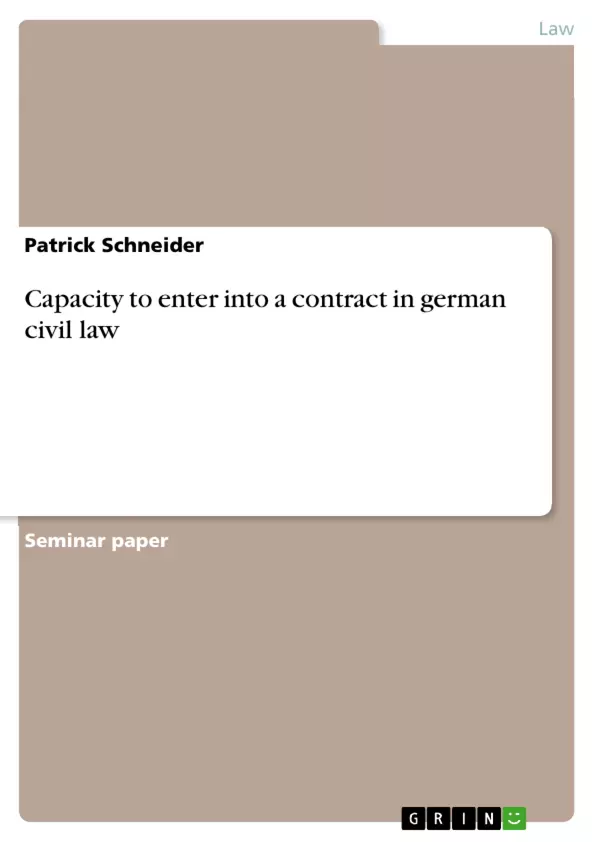The capacity to contract is a fundamental right that empowers a person to participate in everyday life. To protect certain groups of people from legal transaction that overreach and overexerts them, there a laws in the BGB that limit or deny their contracting capacity. However, sometimes there are cases in which the deficiencies to contract seem to have more disadvantages than advantages for a person. That can be the case in surrogate businesses or if it is not practicable to get the consent of a parent. Especially when it comes to children who are acting anonymously in the internet, it will be challenging in the future for retailers to deal with them. For example, 1 on July 28 in 208, the AG Berlin-Mitte ruled in favour of a father whose daughter had bought a subscription for ringtones without his consent. In this case, the provider "Jamba" was left empty-handed.2 In the light of digitalisation it has become more and more usual to make subscription based contracts not only for hardware but for software as well. Software like photoshop or even office software can be licensed and subscription based. Since those kinds of contracts are not included in the pocket money section, it may become hard for retailers to directly contract with minors without asking for the consent of their parents that would have to reach them directly, which can be rather unpractical.
Inhaltsverzeichnis (Table of Contents)
- Introduction
- Capacity to contract.
- Deficiencies to contract..
- Incapacity to enter a contract..
- Limited capacity to enter a contract.
- Partial capacity to enter a contract..
- Conclusion.......
Zielsetzung und Themenschwerpunkte (Objectives and Key Themes)
This assignment aims to address the question of who is capable of entering into a contract under German civil law. The focus is on understanding the legal concept of capacity to contract within the BGB and how it applies to different individuals. The assignment explores the various deficiencies to contract, including those related to minors and individuals with mental disturbances.
- Capacity to contract in German civil law
- Deficiencies to contract for non-adults
- Deficiencies to contract for individuals with mental disturbances
- Implications of digitalization and online transactions
- Legal challenges in protecting vulnerable individuals
Zusammenfassung der Kapitel (Chapter Summaries)
- Introduction: This chapter establishes the context for the assignment, highlighting the significance of contractual capacity in everyday life and the challenges posed by digitalization. It discusses the role of the BGB in regulating and protecting vulnerable individuals from legal transactions.
- Capacity to contract: This chapter defines the concept of capacity to contract and its foundation within the German civil code (BGB). It explains how the BGB assumes that every person is generally capable of entering into a legal transaction.
- Deficiencies to contract: This section delves into the various limitations placed on individuals' capacity to contract, particularly in cases of minors and those with mental disturbances. It examines the specific circumstances and considerations that affect individuals' ability to engage in legally binding agreements.
Schlüsselwörter (Keywords)
The core themes and concepts explored in this assignment include contractual capacity, German civil law, BGB, deficiencies to contract, minors, mental disturbances, digitalization, online transactions, and legal protection for vulnerable individuals. The assignment focuses on the legal framework and considerations surrounding individuals' ability to enter into legally binding contracts.
Frequently Asked Questions
What is "capacity to contract" under the German BGB?
It is the legal empowerment of a person to engage in binding legal transactions. The BGB generally assumes adults have full capacity unless specific deficiencies exist.
What are the different levels of contracting capacity in Germany?
German law distinguishes between full capacity, limited capacity (typically for minors aged 7-17), and total incapacity (children under 7 or those with permanent mental disturbances).
What is the "pocket money section" (Taschengeldparagraph)?
It allows minors with limited capacity to enter into contracts without explicit parental consent if they fulfill the contract using means provided for that purpose by their legal guardians.
How does digitalization affect contracts with minors?
Online subscriptions (like ringtones or software) often exceed the "pocket money" scope, making it difficult for retailers to ensure a contract is valid without parental consent.
What happened in the Jamba case mentioned in the text?
The court ruled in favor of a father whose daughter bought a subscription without consent, leaving the provider without a legal claim because the minor lacked capacity for that transaction.
- Quote paper
- Patrick Schneider (Author), 2019, Capacity to enter into a contract in german civil law, Munich, GRIN Verlag, https://www.grin.com/document/464711



